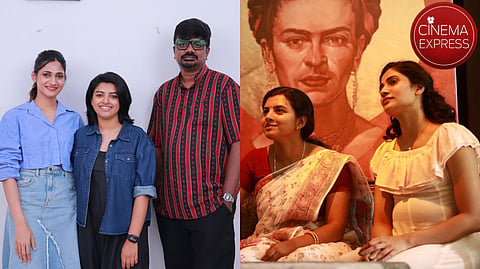Gentlewoman Team Interview | Joshua Sethuraman: Any film that goes through censorship is a political film
Joshua Sethuraman describes his directorial debut Gentlewoman as a poignant exploration of the societal constraints that govern women’s lives. This is perhaps why the Lijomol Jose and Losliya Mariyanesan starrer is fittingly releasing a day before International Women's Day. “In our families, women are rarely free to pursue their dreams. There’s always someone dictating their path—whether they’re young, middle-aged, married, or even grandparents. Realising that many women lack true freedom even in the final chapters of their lives was startling to me, and that thought became the foundation for Gentlewoman,” he shares.
Ahead of the release of Gentlewoman, the film’s director, Joshua Sethuraman, and lead actors, Lijomol Jose and Losliya, speak about the film’s theme, the protagonists, and more
Lijomol, you generally take up challenging characters. What about your character Poorni was challenging to you?
My character, Poorni, undergoes a significant shift in perception. She has a certain look and demeanour, yet her actions defy the conventions typically associated with it. I was surprised when Joshua pointed out how Poorni subverts expectations. It took me a while to fully grasp and accept her choices, but Joshua provided compelling reasons that convinced me. What I love most about Poorni is that, at some point, she takes charge of her life and starts living on her own terms.
Losliya, Joshua previously said that this film will show you in a different light. What is different about your character in Gentlewoman compared to your previous work?
Anna is unlike any role I’ve played before. When Joshua first approached me with the character, I had mixed feelings about how she would be perceived. With Poorni, audiences would naturally form a positive opinion based on her looks, whereas Anna would be judged differently because of her appearance. That contrast was a challenge—I wanted to ensure my portrayal felt authentic and convincing. I wouldn’t say it was difficult, but it definitely pushed me out of my comfort zone.
Joshua, you’ve previously mentioned that you’ve tried some technical innovations with Gentlewoman. Can you elaborate?
Technically speaking, even in the trailer, I chose to use the 5:3 aspect ratio—a format that hasn’t been used in Tamil cinema before. I initially wanted to shoot the entire film in that ratio but since not all theatres in the state support that projection, I had to limit it to the trailer. This aspect ratio enhances performances and expressions, allowing the actors to dominate the frame and keeping the focus entirely on their craft. Similarly, there’s a 20-minute stretch in the film where the storytelling relies solely on background music, without any dialogue.
Lijomol, does the pressure of shouldering a message-heavy film get to you?
LJ: I don’t consciously choose scripts just for their messages—I choose roles that give me the space to perform. From the limited scripts I receive, I pick characters that genuinely suit me. It just so happens that I’m often approached for films with a strong message or social awareness. But I’d love to explore light-hearted films as well.
JS: This all comes down to the mindset of filmmakers. By now, I believe they’re confident that Lijomol will trust them when it comes to content-driven films, which is why she’s approached primarily for such roles. But this pattern will change when a filmmaker decides to cast her in a more casual, light-hearted character. In fact, that’s exactly what I’ve attempted with Losliya in this film—breaking away from expectations and showing a different side of her.
Joshua, as someone who is vocal about his political leaning, do you think all filmmakers need to have a political stance?
All humans should have a political standpoint, not just filmmakers. But for directors who claim they make films purely for entertainment, I’d argue that the moment a film goes through CBFC censorship, it becomes political. Even a comedy film isn't exempt—when certain jokes are censored based on prevailing norms, it reflects a specific kind of political influence. So, whether intentional or not, politics seeps into cinema at every level.
What are some pressing women-related issues that need to be addressed?
LJ: I wouldn’t call it a massive issue, but discrimination still exists in the film industry. The very fact that we use terms like 'women-centric films' and 'lady superstar' highlights this disparity—no one ever calls a male-led film male-centric. Beyond that, basic amenities on sets are often lacking, especially for women. In some cases, there isn’t even a separate bathroom for us. What’s more frustrating is the difference in how requests are perceived. If I ask for something as simple as proper facilities, it’s seen as an attitude problem, whereas if a male actor makes the same request, it’s accommodated without hesitation. Even when I advocate for better conditions for my supporting cast and crew, I’m labelled as difficult or arrogant.
LM: I strongly believe that background artists, especially women, deserve better amenities on film sets. Often, they don’t even have a designated space to change their costumes. Providing a common caravan for them to rest and change should be a bare minimum expectation. Simple steps like these can make a huge difference in ensuring dignity and comfort for everyone working on set.
JS: If you look at most feminist films, they often focus on the struggles women face concerning their bodies. This is largely because society has conditioned women to believe they are physically weaker than men. That mindset needs to change. Another glaring issue is censorship. If a woman smokes on screen, it is often censored, while smoking is wrong regardless of gender. Today, an actor who might one day form the government can smoke on screen or perform in a glamour song, and it is celebrated. But if a woman does the same, it is censored. These double standards need to change.

